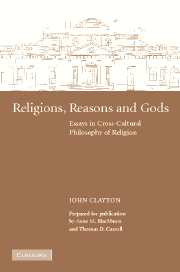Book contents
- Frontmatter
- Contents
- Editorial preface
- Acknowledgments
- List of abbreviations
- 1 Claims, contexts and contestability
- PART I REASON AND RELIGIOUS PLURALISM
- PART II THEISTIC ARGUMENTS IN PRE-MODERN CONTEXTS
- PART III THEISTIC ARGUMENTS IN EARLY-MODERN CONTEXTS
- 8 The debate about God in early-modern French philosophy
- 9 The Enlightenment project and the debate about God in early-modern German philosophy
- 10 The debate about God in early-modern British philosophy
- 11 Beyond the ‘Enlightenment project’?
- Appendix: The 1997 Hulsean Sermon
- Bibliography
- Index
9 - The Enlightenment project and the debate about God in early-modern German philosophy
Published online by Cambridge University Press: 22 September 2009
- Frontmatter
- Contents
- Editorial preface
- Acknowledgments
- List of abbreviations
- 1 Claims, contexts and contestability
- PART I REASON AND RELIGIOUS PLURALISM
- PART II THEISTIC ARGUMENTS IN PRE-MODERN CONTEXTS
- PART III THEISTIC ARGUMENTS IN EARLY-MODERN CONTEXTS
- 8 The debate about God in early-modern French philosophy
- 9 The Enlightenment project and the debate about God in early-modern German philosophy
- 10 The debate about God in early-modern British philosophy
- 11 Beyond the ‘Enlightenment project’?
- Appendix: The 1997 Hulsean Sermon
- Bibliography
- Index
Summary
It has become commonplace in recent philosophical discussion in Europe and America to speak, be it approvingly or disapprovingly, of something called the Modern project or the project of Enlightenment or the Enlightenment project. Each of these phrases has its own local appeal and creates its own conceptual problems. Each can be given a certain tone, so that in one voice it can evoke all the aspirations of the human spirit made free from self-imposed chains; in another voice each phrase can evoke a sense of cultural fragmentation and loss of community. If we try, against all the odds, to encapsulate that project in a single paragraph, we could do worse, I think, than propose something like this:
‘The Enlightenment project in its most general form is an attempt to identify and to justify without recourse to outside authority or private passion but by the exercise of reason and the limits of experience alone what we can truly know, what we ought rightly to do and what we may reasonably hope. Public rationality requires us in all our deliberations to achieve neutrality by divesting ourselves of allegiance to any particular standpoint and to achieve universality by abstracting ourselves from all those communities of interest that may limit our perspective. By this means, the sovereign self sets out to lay sound foundations on which to build with reasoned confidence.’
- Type
- Chapter
- Information
- Religions, Reasons and GodsEssays in Cross-cultural Philosophy of Religion, pp. 222 - 244Publisher: Cambridge University PressPrint publication year: 2006



